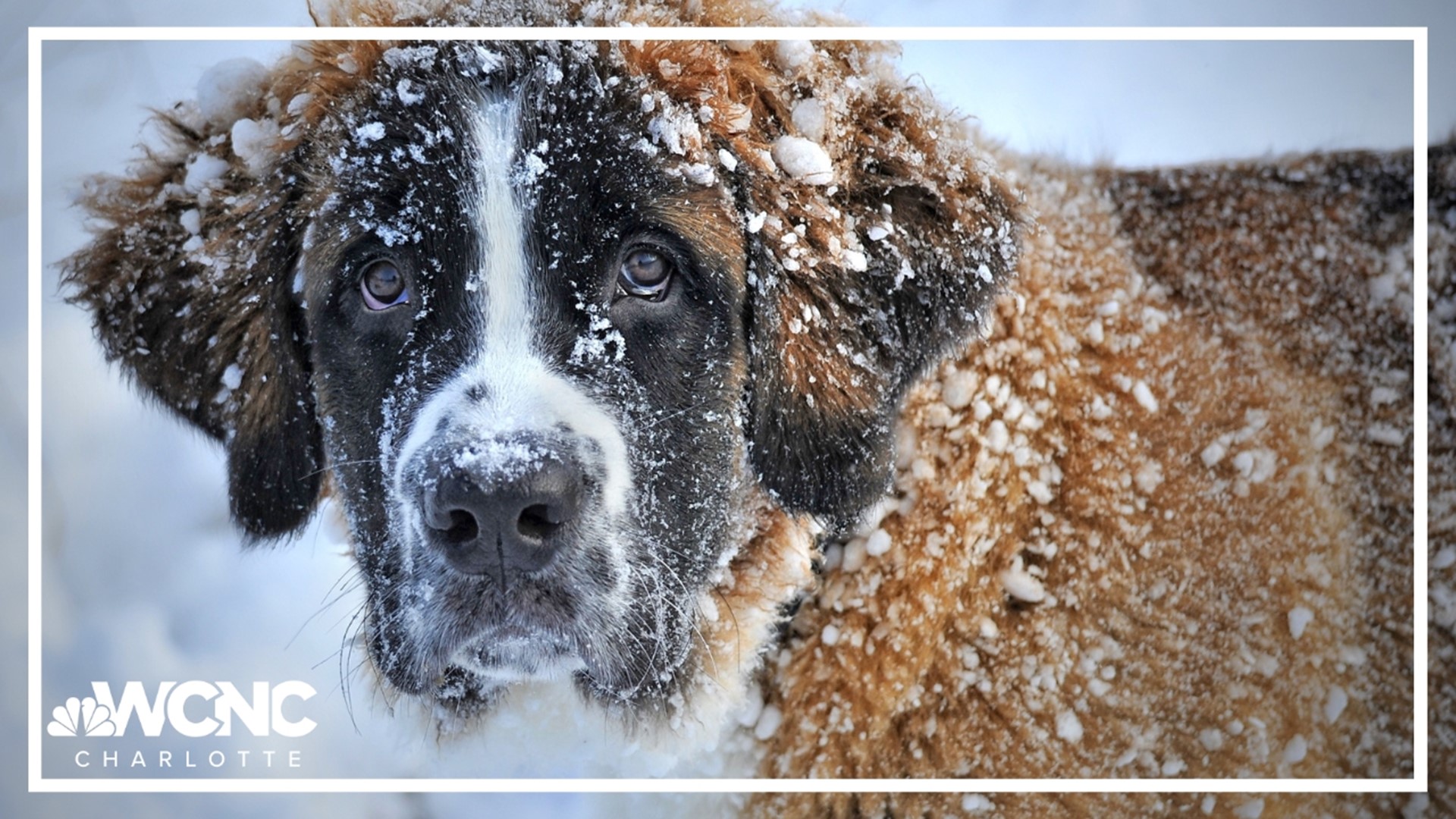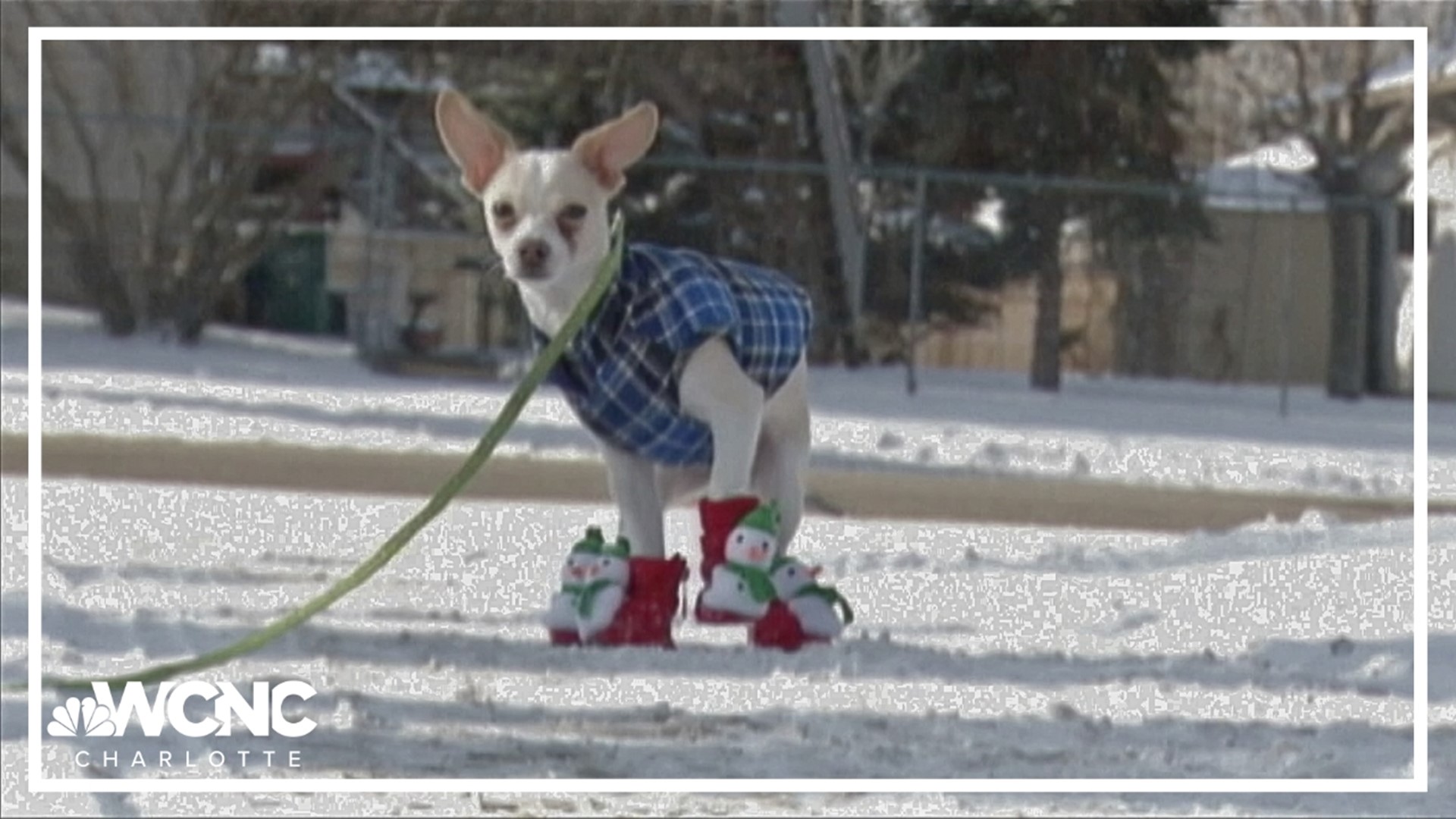CHARLOTTE, N.C. — The Charlotte area is set to see some of its coldest temperatures in more than a year. Temperatures will drop in the teens, and the mountains will have subzero wind chills.
As people take precautions and get prepared for the bitter cold, animal care officials remind them that pets need special protection too.
Melissa Knicely, Communications Director for CMPD Animal Care and Control, said, that with the expected conditions, even outdoor animals accustomed to the cold may need extra care and indoor pets should limit outside time.
"In extreme heat or extreme cold, bring your animals inside," Knicely said. "It's the best thing for them."
For the latest weather alerts, download the WCNC Charlotte mobile app and enable push notifications.
Knicely notes that certain circumstances can prevent an owner from bringing their pet inside. In those cases, county ordinances require proper sheltering of animals.
For a dog house, Knicely said there must be a floor, roof and at least three sides, with the fourth side preferably having a small opening so the dog can crawl inside but still be shielded from the wind.
For the best insulation, the shelter should be raised off the ground, with straw underneath and straw as the bedding.
"The reason we recommend that over like a comforter or blanket... those retain moisture," Knicely said. "Once they get wet and they get cold, they stay wet and cold, and it does not provide any comfort for your pet. Straw tends to dry out quickly and it it stays warmer."
Indoor pets going outside for walks or bathroom breaks may need a sweater, especially if they have short hair, are old, are very young, or are sick. Owners can put booties on them to avoid getting ice melt, salt, and other winter chemicals on their paws, which they might lick, or owners can wipe their paws after walks.
Some county shelters offer free straw when temperatures get dangerously cold, including Gaston County Animal Care & Enforcement. People looking for resources can contact their local animal shelter to see what is available.
While animals are allowed to be kept outside in the City of Charlotte and Mecklenburg County, local ordinances require a certain level of care for them. For example, outdoor pets must have access to fresh water at all times and to adequate shelter, "protected from extremes of weather."
Airline crates, wire cages, or anything with holes other than the main opening are not considered "adequate shelter."
To request a welfare check on an animal that might not be receiving the proper care, people should contact their county animal shelter. In Mecklenburg County, call 311 or chat live with 311 during business hours ( 7 a.m. to 7 p.m.).
"If you have questions about animals that you see out—you may drive by somebody in your neighborhood, or in the community, and you're not quite sure that they have the reasonable shelter or things that they need—you can always do what we call an animal welfare check," Knicely said.
Clemson University College of Agriculture, Forestry and Life Sciences offers additional animal care guidelines for cold weather:
Pets
- Healthy pets accustomed to being outdoors can acclimate to gradually increasing colder temperatures, but no pet should be left outdoors for prolonged periods in severely cold weather. Provide some options for them to stay warm, especially when temperature or wind chill produce temps in the teens or below.
- Bring them indoors (especially if very young or old, ill or arthritic).
- Ensure outdoor enclosures have raised floors, doors turned away from the wind, and clean, dry bedding.
- Check and change drinking water frequently to make sure it hasn’t frozen.
- Depending on the pet’s body condition, some outdoor pets may need more food in winter months. Check with your veterinarian about your pet’s nutritional needs.
- Pets with very short or thin hair, or short legs that allow their bellies contact with the cold ground can benefit from a pet sweater or coat when outside.
- Use extreme caution with space heaters, electric lamps, or pads because of risk of fire or burns.
- Rap on your vehicle’s hood to startle a cat that may have climbed next to the engine for warmth.
- Prevent exposure to antifreeze or other chemicals which can be harmful or deadly.
- Check paws for injuries from ice or deicing chemicals. Consult your veterinarian if signs of illness.
- If power outages or frozen water pipes force your family to seek shelter, check websites for pet-friendly hotels and take along your pet emergency kit (carrier, food, water, medical records, medications), or arrange temporary housing at boarding kennels and veterinary offices.
Horses
- Most horses can live outside in a cold winter without problems. Senior horses with issues associated with older age such as arthritis, dental problems, weight loss and endocrine disease may be more sensitive and need extra attention. The following are recommendations:
- Provide adequate shelter, whether by natural windbreaks or manmade structures. This is especially important to protect horses from moisture and wind that may accompany cold temperatures.
- Ensure adequate and quality feed. Horses usually need extra calories in cold weather.
- Provide a constant supply of high-quality, dry, fresh hay.
- Supplement the diet of geriatric horses, especially those with dental disease, with highly digestible senior diets or mashes.
- Ensure that water is available at all times. Several effective methods are available that can be used to keep ice from forming in water troughs.
- If blankets are used they MUST be checked frequently. Horses can become tangled in blankets that have slipped and they can also develop skin problems when moisture accumulates under blankets.
Livestock
- Livestock (cattle, goats, pigs, sheep) are generally able to acclimate to the colder temperatures that we face in South Carolina. They will often stay together for warmth or seek natural windbreaks such as stands of trees.
- Manmade windbreaks can be placed in open fields if needed.
- Most importantly, check water sources daily to break up surface ice.
- Ensure they have access to feed. Provide good quality hay daily if grass is snow-covered. In prolonged cold weather snaps they may need additional food to help them maintain body temperature.
- All young livestock may need supplemental feed in winter months.
Backyard Poultry
- Provide a coop or house so birds can seek shelter. Temperatures slightly above freezing will keep chickens comfortable. Ensure adequate airflow to prevent humidity or ammonia build-up. Place deep bedding and roosts in the coop. Beware of fire danger if using a heat lamp.
- Place roosts or logs in the yard to keep the birds up and out of the mud and ice.
- Petroleum jelly can be applied as needed to large combs and wattles to prevent frostbite.
- Electrical heated buckets or water base warmers can be used to keep water from freezing.
- Feed good quality feed specific for your poultry type. In cold months you can supplement with scratch feed.
- Artificial lighting can be used to continue egg-laying during the winter months.
Contact Vanessa Ruffes at vruffes@wcnc.com and follow her on Facebook, X and Instagram.


